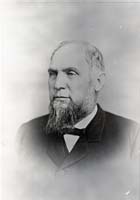George Washington Glick facts for kids
Quick facts for kids
George Washington Glick
|
|
|---|---|
 |
|
| 9th Governor of Kansas | |
| In office January 8, 1883 – January 12, 1885 |
|
| Lieutenant | David W. Finney |
| Preceded by | John St. John |
| Succeeded by | John A. Martin |
| Member of the Kansas State Legislature | |
| In office 1862 |
|
| Personal details | |
| Born | July 4, 1827 Fairfield County, Ohio |
| Died | April 13, 1911 (aged 83) Atchison, Kansas |
| Political party | Democratic |
| Spouse | Elizabeth Rider |
| Profession | Attorney, politician |
George Washington Glick (July 4, 1827 – April 13, 1911) was an important leader in Kansas. He was the ninth Governor of Kansas, serving from 1883 to 1885. He was also the first Democrat to hold this position.
Early Life and Career
George Washington Glick grew up on his father's farm in Ohio. When he was 21, he started studying to become a lawyer. He learned from a law firm that included Rutherford B. Hayes, who later became a U.S. President. Two years later, Glick became a lawyer. He was known for being very hard-working.
In 1859, Glick moved to Atchison, Kansas. He started a law partnership there. During the American Civil War, he served as a soldier for the Union. He was part of the 2nd Kansas Infantry.
After the war, Glick entered politics. He was elected to the Kansas State Legislature in 1862. He served in the state legislature for 14 out of the next 18 years. His colleagues respected him and thought he was fair and skilled.
Becoming Governor
In 1882, George Glick was elected Governor of Kansas. He served one term, from 1883 to 1885. He made history as the first Democrat to become governor of Kansas.
During his time as governor, several new laws were passed. These laws helped create a railroad commission. They also improved roads and changed tax rules. A livestock sanitary commission was also started to help with animal health.
After his term as governor, President Grover Cleveland appointed Glick as a pension agent in Topeka, Kansas. This job involved helping people get their pensions.
Later Life and Legacy
After 15 years of public service, George Glick had to stop his political career. He developed a throat infection that made it hard for him to speak. However, he continued to work as a lawyer for different railroad companies.
He also managed his own farm. Glick was a founding member and the first vice president of the Kansas Historical Society. This group works to preserve Kansas history.
In 1900, he ran for the U.S. Congress. He ran against Charles Curtis, who was very popular at the time. Curtis won the election.
George Glick passed away in 1911 in Atchison, Kansas.
Statue in the U.S. Capitol
In 1914, Kansas honored George Glick with a statue. A marble statue of Glick was placed in the U.S. Capitol building. It was part of the National Statuary Hall Collection. Each state can donate two statues to this collection. The statue was made by a sculptor named Charles Niehaus.
In 2003, Kansas decided to replace Glick's statue. They replaced it with a bronze statue of former President Dwight D. Eisenhower. Kansas was the first state to ever replace a statue in the collection. Glick's original statue was moved to the Kansas History Center in Topeka.
 | Bayard Rustin |
 | Jeannette Carter |
 | Jeremiah A. Brown |

